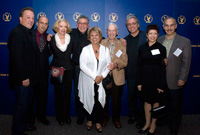
DGA CAREER TRIBUTE
In 2009, the Directors Guild of America Latino Committee honored Mr. Trevino with a career tribute for contributions to the DGA and to the Latino Community. The recognition included appearances by a host of producers, directors and actors with whom Mr. Trevino has worked with over the years.

LA RAZA NUEVA
In September of 1968, Jesús Treviño participated in a six-day sit-in at the boardroom of the Los Angeles Unified School District to protest the ouster of Mexican American high school teacher Sal Castro. Using a Super-8 film camera, Treviño explored the inferior education that Mexican American children were receiving and documented the dynamics of the sit-in which resulted in numerous arrests and in the reinstatement of Castro to this teaching post. La Raza Nueva was the twenty-minute film that resulted. (Pictured: Hilda Reyes Jensen)
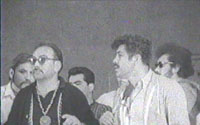
DENVER YOUTH CONFERENCE
In March of 1969 Jesús Treviño attended the First National Youth Conference sponsored by the Crusade for Justice in Denver, Colorado. The conference attracted more than 1500 Mexican American youth from throughout the United States and resulted in the articulation of the Plan de Aztlán which defined Chicano nationalism as the driving philosophy of the emerging Chicano civil rights movement. Trevino‘s historic 16mm footage of the conference, including the dramatic raising of the Mexican flag over the Colorado State Capital building and marches through the streets of Denver was later incorporated into the four-part documentary series CHICANO! History of the Mexican American Civil Rights Movement (1995).
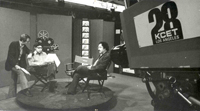
AHORA
In 1969 public television KCET in Los Angeles inaugurated the first Mexican American public affairs program, AHORA! which was broadcast live nightly from a satellite studio based in the heart of the East Los Angeles barrio. Jesús Treviño served as Associate Producer, writer and co-host of the program’s 175 half-hour shows (1969-1970).

SOLEDAD
In 1971, Jesús Treviño and KCET producer Sue Booker visited California's Soledad prison to investigate allegations that prison guards were providing white inmates with knives to kill African American and Chicano inmates. During the five days of filming at Soledad, the two producers were able to penetrate the infamous "hole," X and O Wings of the prison, where political prisoners were detained. The documentary won First Prize and Special Juror’s Award at the Atlanta International Film Festival. Variety said of the film, “this documentary was marked by excellent and intelligent writing, fluid camerawork and a rare sensibility on the part of the producers.”
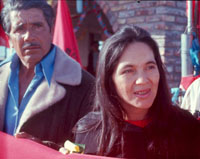
YO SOY CHICANO
In 1972, Jesús Treviño wrote and produced the first nationally broadcast documentary about Mexican Americans titled Yo Soy Chicano. The one-hour 16 mm film presented an overview of Mexican American history from the time of the Spanish conquest of the Americas to the present and profiled key Chicano leaders and social issues of the time. The film was innovative in its use of dramatic recreations to relate Chicano history. It was described by the Los Angeles Times as "... a splendid work of television...that captures the Chicano soul. Rarely has this misbegotten medium been so skillfully and so properly used.” The Washington Post called it "...one of the truly provocative programs of the year" and Luis Valdez described it as "germinal and prophetic. A great fistful of seeds thrown into the growing field of Chicano
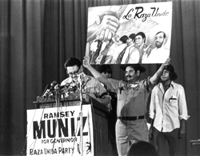
LA RAZA UNIDA
In 1972 Jesús Treviño served as the media coordinator for the first National Convention of the Raza Unida political party held in El Paso, Texas from September 1-4. He also wrote and produced a half-hour film titled LA RAZA UNIDA which was broadcast over KCET on January 4, 1973. The film chronicles the events of the convention and includes an exclusive behind-the-scenes look at party leaders José Angel Gutiérrez and Rodolfo “Corky” Gonzalez discussing strategies for building a national voting block of Latinos in the United States..
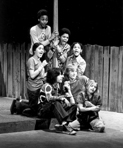
LINFINITY FACTORY
In 1975-76 Jesús Treviño served as Executive Producer of The Infinity Factory, a half-hour magazine format program designed to teach mathematics to children ages 9-11 years of age. The program included dramatic segments, cartoon animation and documentary elements and was broadcast nationally over the Public Broadcast Service (PBS). It won the Action for Children’s Programming Award of Excellence for children’s programming.

RAICES DE SANGRE
In 1976. Jesús Treviño wrote and directed the Mexican feature film Raices de Sangre (Roots of Blood) for Conacine Productions in Mexico City. The film, chronicling the creation of an international union of garment workers in a Texas border town, was the first co-production involving Mexican and Chicano actors from both sides of the border. The film was released in an English subtitled format in the United States in 1979. Variety called the film “a solidly made call to political involvement and activism.
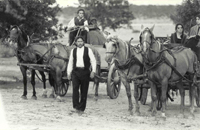
SEGUIN
In 1979, Jesús Treviño wrote and directed the American Playhouse Drama Seguín which was broadcast nationally over PBS in 1980. The film tells the conflictive story of Juan Seguín and other Tejanos who fought on the side of the Anglo Americans against Mexican General Santa Ana at the battle of the Alamo.. The Associated Press described it as "a sensitive, faithfully reconstructed and beautifully filmed biography of a hero of the revolution in Texas in the mid-1830s who becomes a victim of racial and cultural prejudice."
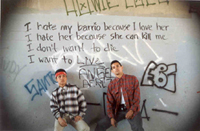
GANGS
In 1988, Jesús Treviño directed the CBS After School Special Gangs which was distinguished by its sensitive treatment of the gang problem in Latino barrios. The program won the Imagenes Award of Merit, the best one-hour drama award at the New York Latino Film Festival and was recognized as Best Daytime Television drama by the Director’s Guild of America.

BIRTHWRITE
In 1989, Jesús Treviño produced the one-hour docu-drama Birthwrite, directed by Luis R. Torres. The video showcased childhood experiences in the Latino community as portrayed by eight Latino writers: Lorna Dee Cervantes, Judith Ortiz Cofer, Rolando Hinojosa, Tato Laviera, Alejandro Morales, Nicholasa Mohr, Alberto Rios and Edward Rivera.
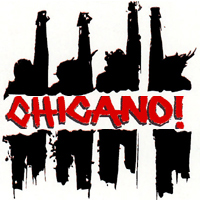
CHICANO!
History of the Mexican American Civil Rights Movement
Beginning in 1991, Jesús Treviño, along with Luis R. Torres and José Luis Ruiz, researched and raised funding for a four-part documentary on the Mexican American civil rights movement of the 1960s. The series was broadcast nationally over the Public Broadcasting Service (PBS) in 1995. Treviño served as Co- Executive Producer for the series which won the Imagenes Award and the Nosotros Golden Eagle Award for best documentary.

RESURRECTION BLVD.
In 1999, Jesús Treviño directed the two-hour made for television pilot movie Resurrection Blvd. for the SHOWTIME cable network. The movie, from a script by Dennis E. Leoni, was so successful that SHOWTIME ordered a television drama series based on the movie’s characters. Treviño served first as Supervising Producer and then as Co- Executive Producer for the drama series and established the visual look and style to the series which ran for three seasons (2000-2002).
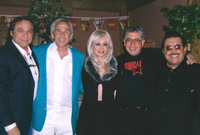
RAICES DE SANGRE TRIBUTE
In 2006, The Reel Rasquachi Film Festival at California State University at Los Angeles, honored Mr.Treviño with a Tribute Screening of his 1976 visionary and prophetic Mexican feature film, RAICES DE SANGRE. The theme of the immigrants crossing into the United States to find a better life, found a new audience in the wake of national, Day Without An Immigrant marches.










